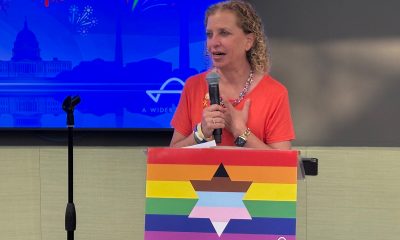News
Kyrsten Sinema wins Arizona primary, major first as bisexual candidate


Rep. Kyrsten Sinema (D-Ariz.) has won her primary in a bid foe a U.S. Senate seat. (Photo by Gage Skidmore; courtesy Flickr)
Arizona Rep. Kyrsten Sinema (D-Ariz.) achieved a significant victory on Tuesday in the Arizona primary when she became the first openly bisexual person to win a major party nomination to run for a U.S. Senate seat.
The Associated Press declared Sinema, a three-term member of Congress, the winner at 9:21 local time after polls closed in Arizona at 7 pm. Sinema was in a contest against Muslim progressive activist Deedra Abboud for the Democratic nomination to run for the open U.S. Senate seat in Arizona.
With 94 percent of precincts reporting, Sinema won 80.5 percent of the vote compared to the 19.5 percent won by Abboud, according to results from the New York Times.
The primary contest is to run for the seat being vacated by Sen. Jeff Flake (R-Ariz.), who announced he wouldn’t seek another term in the U.S. Senate and remains outspoken with his own party against President Trump. (The other seat representing Arizona in the U.S. Senate after the death of John McCain will be filled by a interim replacement chosen by the Arizona governor and come up for a vote in the general election in 2020.)
As the only openly bisexual member of Congress and co-chair of the LGBT Equality Caucus, Sinema has taken the lead on LGBT issues during her time in Congress. Among other things, Sinema was a co-sponsor of the Equality Act, comprehensive legislation that would prohibit anti-LGBT discrimination in all areas of federal civil rights law and legislation against Trump’s attempted ban on transgender service members.
Representing a moderate district in Congress, Sinema has taken votes in line with the Republican caucus that have angered progressive and LGBT activists. Sinema has never voted for House Minority Leader Nancy Pelosi (D-Calif.) as speaker, voted to delay implementation of the individual mandate in Obamacare and voted for a measure that would have inhibited Syrian refugees from coming to the United States.
Also revealed in the Arizona primary was the Republican opponent whom Sinema would face in the general election. The winner on the Republican side was Martha McSally, a former Air Force pilot who represents Arizona’s 2nd congressional district in Congress.
Other candidates were Kelli Ward, a former member of the Arizona State Senate, and former Maricopa County Sheriff Joe Arpaio, who declared his candidacy after President Trump granting him a pardon for violating the law in his enforcement of immigration law.
McSally won 52.9 percent of the vote in the Republican primary, compared to the 28.2 percent won by Ward and the 18.9 percent won by Arpaio.
Although McSally has served in the U.S. House for only two terms, she has already cast at least one anti-LGBT vote. The Arizona Republican vote in favor of an amendment on the House floor introduced by anti-LGBT Rep. Vicky Hartzler (R-Mo.), which would have the barred from the U.S. military from paying for transition-related care for transgender people, including gender reassignment surgery.
McSally has also opposed interpreting Title IX of the Education Amendment of 1972 to require school to allow transgender kids to use the restrooms consistent with their gender identity, saying during a town hall early last year the matter is best handled at the local level.
In 2016, McSally was also one of the 33 Republicans in committee to vote in favor of an amendment to major defense authorization legislation that would have weakened President Obama’s executive order against anti-LGBT workplace discrimination. Although the committee approved the amendment, it was later taken out in conference deliberations.
Annise Parker, CEO of the LGBTQ Victory Fund, said Sinema “shattered a lavender ceiling” in the primary, but the race against McSally will also be significant.
“This race is consequential not just for the Democratic party and for the LGBTQ community, but for all Americans who demand an end to the political divisiveness that Martha McSally embodies,” Parker said. “An LGBTQ Senate candidate taking down an anti-LGBTQ opponent in a red state will be a defining moment in this year’s rainbow political wave – and will further the evolution in how Americans view LGBTQ people and candidates.”
Sinema wasn’t the only LGBT candidate in a primary race on Tuesday night. Other LGBT candidates were in the fray in Arizona and Florida and had different results:
* In Florida’s 18th congressional district, lesbian candidate and former State Department official Lauren Baer won the Democratic nomination over attorney Pam Keith by a 60-40 margin. Baer will face off against incumbent Rep. Brian Mast (R-Fla.) in the general election.
* Also in Florida, Donna Shalala, a former official with the Department of Health & Human Services during the Clinton, narrowly defeated openly gay State Rep. David Richardson for the Democratic nomination to run in Florida’s 27th congressional district. Shalala will run against Maria Elvira Salazar in race to succeed retiring Rep. Ileana Ros-Lehtinen (R-Fla.) in Congress.
* In Arizona, gay candidate and former Arizona State Rep. Matt Heinz came up short in a bid to claim the Democratic nomination to run in Arizona’s second congressional district against former U.S. Rep. Ann Kirkpatrick.
District of Columbia
Gay ANC member announces candidacy for Ward 1 D.C. Council seat
Community leader Brian Footer seeking seat held by Brianne Nadeau

Gay Advisory Neighborhood Commissioner Brian Footer, a community activist who has been involved for many years in local and national government affairs, has announced his candidacy for the Ward 1 D.C. Council seat up for election in 2026.
Footer, a Democrat, will be running in the city’s June 2, 2026, Democratic primary for the Ward 1 Council seat, but it is uncertain whether he will be running against incumbent Ward 1 Council member Brianne Nadeau (D). Nadeau has not yet announced if she plans to run for re-election for a fourth term following her 12 years on the Council.
Nadeau has been a longtime vocal supporter of the LGBTQ community.
If Footer were to win the primary and the November 2026 general election, he would become the Council’s second openly gay member. Ward 5 Council member Zachary Parker (D) is currently the 13-member Council’s only gay member.
Footer is a three-term ANC commissioner who currently serves as Chair of ANC 1E, which represents the city’s Adams Morgan neighborhood.
“Brian has worked at every level of government — federal, state, and local — building a career rooted in public service, aging policy, and inclusive urban planning,” a statement on his campaign website says.
“I’m running for Council because too many people in Ward 1 are doing everything right and still feel ignored by the city they call home,” Footer states on his website.
“I’m running because we can do better,” his statement continues. “That means making housing more affordable, addressing homelessness with real solutions, and keeping our neighborhoods safe with smart, community focused strategies.”
When contacted by the Washington Blade for comment, Nadeau said she was not ready at this time to discuss her plans about running again or about Footer’s candidacy.
“The primary is a ways away, and I’m very focused right now on the budget and the stadium deal and all the work that we’re doing at the Council,” she told the Blade. “So, I really haven’t had time to turn to my plans. So, as a result, I’m also not going to be commenting on anybody else who is determined that they’re running at this time.”
She first won election to the Council in 2014 after she defeated four-term gay Ward 1 Council member Jim Graham in the Democratic primary after Graham became embroiled in an ethics controversy.
In the 2022 Democratic primary Nadeau defeated gay challenger Salah Czapary in a three-candidate race, by a margin of 48.5% of the vote compared to Czapary’s 30.9%.
With the third candidate, Sabel Harris, receiving 20.4%, the outcome showed that the two challengers had a combined total vote count higher than Nadeau.
Further details of Footer’s candidacy can be accessed from his campaign website, brianfooterdc.com.
Spain
Spanish women detail abuses suffered in Franco-era institutions
Barcelona-based photographer Luca Gaetano Pira created ‘Las Descarriadas’ exhibit

A Barcelona-based photographer, audiovisual artist, and activist has created an exhibit that profiles Spanish women who suffered abuse in institutions that Gen. Francisco Franco’s dictatorship established.
Luca Gaetano Pira, who is originally from Italy, spoke with women who the regime, which governed Spain from 1936-1975, sent to Women’s Protection Board institutions.
The regime in 1941 created the board the country’s Justice Ministry oversaw.
Franco named his wife, Carmen Polo, as the board’s honorary president. Then-Prime Minister Felipe González fully dissolved the board in 1985, a decade after Franco’s death.
Gaetano’s exhibit is called “Las Descarriadas” or “The Misguided Women” in English.
“These are women who were detained between 1941 and 1985 for reasons that are unthinkable today: being lesbian, poor, pregnant out of wedlock, rebellious, politically active … or simply considered ‘morally suspect,'” Gaetano noted to the Washington Blade.
Groups affiliated with the Spanish Catholic Church ran these institutions. Gaetano pointed out they were “presented as social assistance centers.”
“In reality, they were spaces of punishment and forced reeducation, where isolation, unpaid work, and psychological violence were the norm,” he said. “Many of the survivors are still alive. Their testimonies are powerful, urgent, and of extraordinary current relevance.”
The regime sent more than 40,000 women to Women’s Protection Board institutions.
“Despite its seemingly benevolent name, it was in fact one of the most powerful instruments of moral and social control over women during and after the dictatorship,” notes the exhibit. “Under the guise of care and re-education, this institution functioned as a repressive apparatus that punished women who deviated from the ideal feminine model imposed by Franco’s regime: submissive, obedient, married, and dedicated to motherhood within the Catholic family structure.”
The Spanish Catholic Church last month issued a public apology, but Gaetano described it as “very soft” and noted “the women did not accept it.” Gaetano also compared the Women’s Protection Board institutions to Ireland’s Magdalene Laundries.
The Associated Press notes tens of thousands of “fallen” women were sent to the laundries that Catholic nuns operated in Ireland from the 18th century until the mid-1990s. Then-Irish Prime Minister Edna Kenny in 2013 issued a formal apology for the abuses that women suffered in the laundries and announced the government would compensate them.
The Spanish government has yet to offer compensation to the women abused in Women’s Protection Board institutions.
“My work focuses on recovering the historical memory of marginalized communities, particularly through the portrayal of survivors of institutional violence and the use of archival materials,” Gaetano told the Blade, noting he has also sought to highlight the repression that LGBTQ people suffered during dictatorships in Portugal and Latin America.
Gaetano’s exhibit can be found here:
District of Columbia
Gay GOP group hosts Ernst, 3 House members — all of whom oppose Equality Act
Log Cabin, congressional guest speakers mum on June 25 event

U.S. Sen. Joni Ernst (R-Iowa) and three women Republican members of the U.S. House appeared as guest speakers at the June 25 meeting of Log Cabin Republicans of D.C., the local chapter of the national LGBTQ Republican group with that same name.
The U.S. House members who joined Ernst as guest speakers at the Log Cabin meeting were Celeste Maloy (R-Utah), Kat Cammack (R-Fla.), and Julia Letlow (R-La.).
Neither D.C. Log Cabin Republicans President Andrew Minik nor spokespersons for Ernst or the three congresswomen immediately responded to a request by the Washington Blade for comment on the GOP lawmakers’ appearance at an LGBTQ GOP group’s meeting.
“Please join us for an inspiring evening as we celebrate and recognize the bold leadership and accomplishments of Republican women in Congress,” a D.C Log Cabin announcement sent to its members states.
“This month’s meeting will highlight the efforts of the Republican Women’s Caucus and explore key issues such as the Protection of Women and Girls In Sports Act and the broader fight to preserve women’s spaces in society,” the message says.
It was referring to legislation pending in Congress calling for banning transgender women from participating in women’s sports events.
According to media reports, Ernst and the three congresswomen have expressed opposition to the Equality Act, the longstanding bill pending in Congress calling for prohibiting discrimination based on sexual orientation and gender identity in the areas of employment, housing, and public accommodations.
The Log Cabin announcement says the meeting was scheduled to take place at the Royal Sands Social Club, which is a restaurant and bar at 26 N St., S.E. in the city’s Navy Yard area.
D.C. Log Cabin member Stuart West, who attended the meeting, confirmed that Ernst and the three congresswomen showed up and spoke at the event.
“It was a good turnout,” he said. “I would definitely say probably 30 or 40 people attended.” West added, “Four women came to talk to a group of mostly gay men. That’s something you don’t see very often.”
-

 Federal Government2 days ago
Federal Government2 days agoTreasury Department has a gay secretary but LGBTQ staff are under siege
-

 Virginia3 days ago
Virginia3 days agoDefying trends, new LGBTQ center opens in rural Winchester, Va.
-

 District of Columbia2 days ago
District of Columbia2 days agoGay GOP group hosts Ernst, 3 House members — all of whom oppose Equality Act
-

 Opinions4 days ago
Opinions4 days agoUSAID’s demise: America’s global betrayal of trust with LGBTQ people












